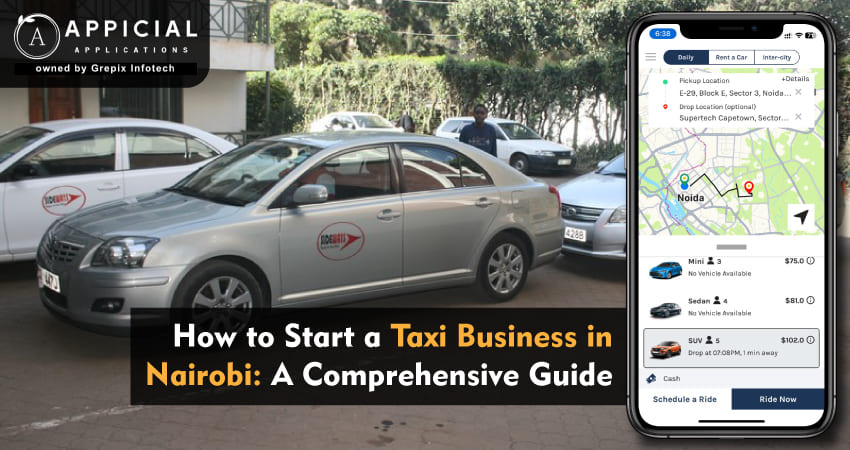
How to Start a Taxi Business in Nairobi: A Comprehensive Guide
The taxi business in Nairobi has seen exponential growth, driven by a bustling urban population and increasing demand for convenient transportation. As one of Africa's fastest-growing cities, Nairobi presents a golden opportunity for aspiring entrepreneurs to tap into this lucrative sector. Whether you’re eyeing traditional taxi services or booming ride-hailing platforms, starting a taxi business can be a profitable venture with the right strategy.
Launching a taxi business in Nairobi is an exciting venture that offers opportunities and challenges. By conducting comprehensive research, following legal requirements, and applying effective strategies for operations and marketing, you can build a successful and sustainable business. As Nairobi continues to grow, so does the potential for your business to thrive. So, take the first step and turn your vision into reality.
The taxi business in Nairobi is booming, fueled by a growing urban population and rising demand for convenient transportation. As one of Africa’s fastest-growing cities, Nairobi offers immense potential for entrepreneurs to establish successful ventures in traditional taxi services and ride-hailing platforms. Success hinges on thorough market research, compliance with legal requirements, and strategic operations and marketing. By leveraging technology, building a strong brand, and maintaining customer satisfaction, businesses can thrive in this competitive market. With Nairobi's continuous growth, the opportunities are endless for aspiring entrepreneurs ready to transform their vision into a profitable and sustainable taxi business.
How to Start Taxi Business in Nairobi
1Research and Planning
Analyze the Taxi Market in Nairobi
Before diving in, it’s essential to understand the dynamics of Nairobi’s taxi industry. Analyze customer preferences, peak service hours, and pricing trends. Evaluate the challenges drivers encounter, such as traffic congestion and competition. Comprehensive market research will enable you to develop a business model that effectively meets local needs.
Identify Target Customers and Competition
Nairobi’s taxi market caters to various groups, including daily commuters, corporate clients, tourists, and late-night revelers. Knowing your target audience helps you to market your services. Simultaneously, analyze competitors, both traditional taxis and ride-hailing giants like Uber and Bolt, to identify gaps in their services that you can fill.
2Legal Requirements and Permits
Registering Your Taxi Business
Operating legally in Nairobi requires proper registration. Start by registering your business name with Kenya’s Business Registration Service. Depending on your structure — sole proprietorship, partnership, or company, you may also need to register with the Kenya Revenue Authority (KRA) for tax compliance.
Necessary Licenses and Insurance
Obtain a Transport Licensing Board (TLB) license to operate commercially. Comprehensive insurance is mandatory to protect your business from unforeseen liabilities. Additionally, ensure all drivers hold valid Public Service Vehicle (PSV) licenses.
3Choosing a Business Model
Traditional Taxi Service vs. Ride-Hailing Platforms
Decide whether to run a traditional taxi service or partner with ride-hailing platforms. Traditional taxis offer direct customer interaction and greater independence, while platforms like Uber provide a ready customer base and marketing support.
Pros and Cons of Partnering with Uber/Bolt
Working with ride-hailing apps reduces initial marketing and software development costs. However, they charge commissions, which can impact your profits. Weigh these factors to choose a model that aligns with your goals and resources.
4Setting Up Your Taxi Fleet
Buying vs. Leasing Vehicles
Your fleet is the backbone of your business. Buying vehicles ensures long-term ownership but requires significant upfront investment. Leasing, on the other hand, minimizes startup costs but adds recurring expenses. Choose a model based on your financial capacity.
Key Features to Consider in Vehicles
Invest in fuel-efficient, comfortable, and durable cars suitable for Nairobi's roads. Prioritize safety features, ample passenger space, and air conditioning to enhance customer satisfaction.
5Financial Planning and Budgeting
Estimating Startup Costs
Starting a taxi business in Nairobi involves several costs. These include purchasing or leasing vehicles, obtaining licenses and permits, and investing in branding and marketing. For instance, a single vehicle might cost between Ksh 800,000 to Ksh 1.5 million if purchased, while leasing rates vary depending on the provider. Additionally, budget for insurance, fuel, maintenance, and driver salaries.
Managing Operating Expenses and Revenue
Your primary operating costs will include fuel, vehicle maintenance, driver wages, and commission fees. To maximize profits, monitor expenses closely and negotiate with fuel suppliers or service centers for discounts. Revenue management is just as critical. Monitor daily and monthly earnings to ensure your pricing is competitive and aligns with the market. Implementing an accounting system helps keep your finances transparent and manageable.
6Hiring and Training Drivers
Recruitment Process for Drivers
Finding the right drivers is crucial to your taxi business's success. Advertise openings on job boards, social media, or even local matatu stages. Ensure applicants have valid PSV licenses, a clean driving record, and familiarity with Nairobi's routes. Conduct background checks to ensure safety and reliability.
Training for Customer Service and Safety
Once hired, provide drivers with training to enhance their skills. Focus on customer service, emphasizing professionalism, punctuality, and courtesy. Educate them on safety protocols, both for road safety and dealing with emergencies. Regular refresher courses keep standards high and maintain your business’s reputation.
7Branding and Marketing
Designing a Recognizable Brand
Your brand is what sets you apart in a competitive market. Develop a catchy name, logo, and tagline that resonates with your target audience. Uniform branding across your vehicles, website, and social media pages fosters trust and recognition.
Effective Marketing Strategies
Marketing is the lifeblood of your taxi business. Leverage both online and offline strategies to attract customers. Use social media platforms like Facebook and Instagram to advertise promotions or share testimonials. Partner with hotels, tour companies, and local businesses for referrals. Flyers and billboards in high-traffic areas also work well to build visibility.
8Leveraging Technology
Investing in a Taxi Dispatch System
A robust dispatch system streamlines bookings and improves efficiency. Look for software that tracks vehicles in real time, manages driver assignments, and integrates payment options. This technology not only saves time but also enhances customer trust.
Mobile Apps for Customer Convenience
In today’s digital age, a user-friendly mobile app is a game-changer. Your app should allow customers to book rides, track their taxis, and pay online. Offer features like estimated fare calculators and customer feedback to improve user experience and loyalty.
Also Read: Driving to Wealth: How to Become a Billionaire in South Africa's Taxi Business
9Maintaining Customer Satisfaction
Offering Reliable and Timely Services
Reliability is crucial in the taxi business. Customers expect prompt pick-ups and smooth rides. To meet these expectations, ensure your vehicles are well-maintained and drivers are punctual. Use GPS systems to optimize routes, especially in Nairobi’s busy traffic. Regularly monitor and improve service delivery to build a loyal customer base.
Handling Customer Complaints
Even the best services may encounter occasional complaints. Handle these promptly and professionally to maintain your reputation. Establish a clear process for logging and resolving complaints, whether about a driver’s behavior, pricing, or vehicle condition. Encourage customer feedback to identify areas of improvement and demonstrate that their opinions matter.
10Adapting to Challenges in the Industry
Navigating Traffic Congestion in Nairobi
Nairobi’s heavy traffic is one of the biggest challenges for taxi operators. Drivers must familiarize themselves with alternative routes to avoid delays. Partnering with traffic monitoring services or apps like Google Maps can help drivers find the fastest paths during peak hours. Encourage flexible scheduling to manage ride demands effectively.
Addressing Competition in the Market
The rise of ride-hailing platforms has intensified competition. To stand out, offer unique services such as loyalty programs, competitive pricing, or premium car options. Focus on areas where big players may lack, such as serving less-covered neighborhoods or offering specialized services like airport transfers or corporate transport.
11Scaling Your Taxi Business
Expanding Your Fleet and Services
As your business grows, reinvest profits to add more vehicles to your fleet. Diversify your services to include options like premium taxis, minibusses for groups, or even boda bodas (motorbike taxis) for quick commutes. Expanding your service areas to cover Nairobi’s outskirts or nearby towns can attract more customers.
Exploring Niche Markets like Corporate Partnerships
Corporate clients are a steady and lucrative market. Approach companies, hotels, and tour operators to offer exclusive transportation contracts. Build relationships with organizations requiring daily staff transportation or regular airport transfers. This stable income stream can significantly boost your profitability.
Conclusion
The taxi business in Nairobi is thriving, presenting endless opportunities for entrepreneurs to establish and grow their ventures. From traditional taxi services to cutting-edge ride-hailing platforms, the potential for success is vast with the right strategies, research, and customer focus. By understanding the unique dynamics of Nairobi's market, complying with legal requirements, and leveraging technology, aspiring business owners can carve a niche in this competitive industry.
Appicial Applications stands as a trusted partner for entrepreneurs in the taxi business. With our expertise in developing robust taxi app solutions, we help businesses seamlessly integrate technology into their operations, enhancing efficiency and customer satisfaction. Our tailored software solutions empower you to manage your fleet, streamline bookings, and deliver exceptional customer experiences, ensuring you stay ahead in this fast-evolving market.
As Nairobi continues to expand as a commercial and cultural hub, the demand for reliable transportation solutions will only increase. Partner with Appicial Applications to transform your vision into a thriving taxi business, leveraging our innovative technology and industry expertise. Together, let’s drive your business toward unparalleled success in Nairobi’s dynamic market.
FAQs
Looking out to start your own venture like Uber ? Try out our HireMe Taxi Uber Clone, the easiest way to kick-start your taxi business.
Author's Bio

Saleem Ahmed is a skilled digital marketer at Grepix Infotech, known for executing data-driven strategies that boost online visibility. His expertise consistently drives engagement and lead generation across digital platforms.
Back to blog list




